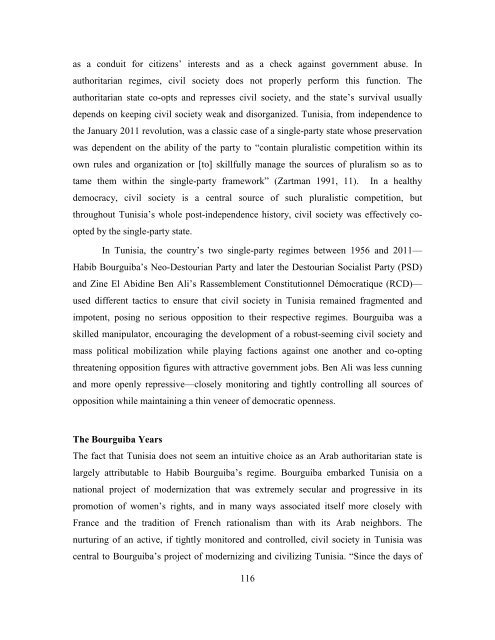Tunisia: Understanding Conflict 2012 - Johns Hopkins School of ...
Tunisia: Understanding Conflict 2012 - Johns Hopkins School of ...
Tunisia: Understanding Conflict 2012 - Johns Hopkins School of ...
Create successful ePaper yourself
Turn your PDF publications into a flip-book with our unique Google optimized e-Paper software.
as a conduit for citizens’ interests and as a check against government abuse. In<br />
authoritarian regimes, civil society does not properly perform this function. The<br />
authoritarian state co-opts and represses civil society, and the state’s survival usually<br />
depends on keeping civil society weak and disorganized. <strong>Tunisia</strong>, from independence to<br />
the January 2011 revolution, was a classic case <strong>of</strong> a single-party state whose preservation<br />
was dependent on the ability <strong>of</strong> the party to “contain pluralistic competition within its<br />
own rules and organization or [to] skillfully manage the sources <strong>of</strong> pluralism so as to<br />
tame them within the single-party framework” (Zartman 1991, 11). In a healthy<br />
democracy, civil society is a central source <strong>of</strong> such pluralistic competition, but<br />
throughout <strong>Tunisia</strong>’s whole post-independence history, civil society was effectively coopted<br />
by the single-party state.<br />
In <strong>Tunisia</strong>, the country’s two single-party regimes between 1956 and 2011—<br />
Habib Bourguiba’s Neo-Destourian Party and later the Destourian Socialist Party (PSD)<br />
and Zine El Abidine Ben Ali’s Rassemblement Constitutionnel Démocratique (RCD)—<br />
used different tactics to ensure that civil society in <strong>Tunisia</strong> remained fragmented and<br />
impotent, posing no serious opposition to their respective regimes. Bourguiba was a<br />
skilled manipulator, encouraging the development <strong>of</strong> a robust-seeming civil society and<br />
mass political mobilization while playing factions against one another and co-opting<br />
threatening opposition figures with attractive government jobs. Ben Ali was less cunning<br />
and more openly repressive—closely monitoring and tightly controlling all sources <strong>of</strong><br />
opposition while maintaining a thin veneer <strong>of</strong> democratic openness.<br />
The Bourguiba Years<br />
The fact that <strong>Tunisia</strong> does not seem an intuitive choice as an Arab authoritarian state is<br />
largely attributable to Habib Bourguiba’s regime. Bourguiba embarked <strong>Tunisia</strong> on a<br />
national project <strong>of</strong> modernization that was extremely secular and progressive in its<br />
promotion <strong>of</strong> women’s rights, and in many ways associated itself more closely with<br />
France and the tradition <strong>of</strong> French rationalism than with its Arab neighbors. The<br />
nurturing <strong>of</strong> an active, if tightly monitored and controlled, civil society in <strong>Tunisia</strong> was<br />
central to Bourguiba’s project <strong>of</strong> modernizing and civilizing <strong>Tunisia</strong>. “Since the days <strong>of</strong><br />
116
















